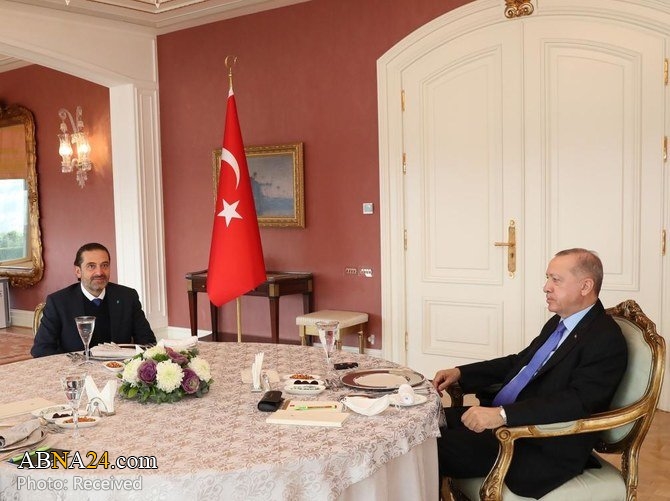AhlulBayt News Agency (ABNA): While a grand economic crisis prevails in Lebanon due to deep-rooted economic challenges and the political parties fail to agree on forming a new cabinet, Lebanon’s Designate-Prime Minister Saad Hariri made a surprise visit to Turkey and talked to President Recept Tayyip Erdogan.
Although media reported that economic partnership, bilateral interests in Turkey’s role in Beirut port reconstruction, and prevention of Lebanese economic collapse took a center stage in the discussions, the visit carries important political messages.
Taking part in Beirut port reconstruction
Definitely, the central point in the Turkish-Lebanese discussions was economic cooperation. Lebanon is facing a financial hyper-crisis, making Beirut in desperate need of international help. Meanwhile, the outbreak of the coronavirus and the devastating blasts in the Beirut port in early August last year adds to the crisis severity.
One of the areas that Hariri hopes to get the Turkish help is rebuilding the totally demolished Beirut port. Another hope is connected to a promise made by the Turkish Vice-President Fuat Oktay during a visit to the Lebanese capital shortly after the enormous blast that razed to the ground the whole port and part of Beirut. During the visit, Oktay promised that until the Lebanese port is rebuilt and re-opened, Turkey will make its Port of Mersin at Lebanon service for trade.
Turkey interested in getting a foothold in Lebanon
Trying to rebuild its influence in the former parts of the Ottoman Empire under Erdogan and the ruling Justice and Development Party (AKP) using neo-Ottomanist agenda, Tukey marks Lebanon as one of the parts it should gain sway over due to its rich Mediterranean energy resources and also its important geopolitical feature of being close to the occupied Palestinian territories and Syria.
About 50,000 to 80,000 Turkmen ethnic minority population lives in Akkar north of Lebanon. Also, Mardali tribes, with a population of 20,000 to 30,000 who are originally from Mardin in southeastern Turkey live in Lebanon. Turkey thinks that it can support the Turkish presence in Lebanon. Also, the Islamic views and pro-Muslim Brotherhood policy of Ankara can help Turkey promote its influence among the Sunnis of Lebanon.
Turkey’s challenges are not few, however. The Maronite Christians, who are close to France, are pessimistic about Ankara, best shown in the remarks of President Michel Aoun of Lebanon at the 100th anniversary of the foundation of the country.
Goals and implications of the trip
The Turkish push to strengthen its influence in the Lebanese developments can open Ankara's feet to the regional rivalry as Hariri chose Turkey as the destination for his visit, while the political limbo remains in his country. Turkey is currently at loggerheads with other countries of influence in Lebanon like France and Saudi Arabia for its meddling in the Libya crisis, involvement in disputed energy explorations in the Eastern Mediterranean, and also support to the Muslim Brotherhood.
So, one message of the visit could be that Ankara wants to tell Paris, which does not advocate a Turkish presence in Lebanon, it needs to accelerate the provision of financial aids approved in the CEDRE conference to the Lebanese government and also abandon the pressure on Hariri to form a joint government with Hezbollah.
It is noteworthy that after a visit of the French President to Lebanon following the incident, Erdogan accused him of following the “colonialist” agenda in the Arab country, signaling that Ankara looks at Lebanon as another potential front of competition against France in the Mediterranean Sea.
Another reason to link the regional rivalry to the surprise visit of Hariri is the vacillating Saudi-Turkish relations.
Turkish-Saudi relations headed to chill when Ankara supported the Muslim Brotherhood struggle to get power in the Arab world in the wake of the Arab uprisings. The chilly ties between the two actors even worsened when Saudi Arabia along with the UAE, Egypt, and Bahrain cut off ties with Qatar and imposed an economic blockade on it in 2017 and also when Saudi Arabia assassinated the outspoken Saudi writer Jamal Khashoggi at its consulate in Ankara in October 2018. This raises questions about if there are links between the Saudi ignorance of Hariri's help demands and this visit. Questions of this kind forced Saudi Arabia to break its silence and in a statement deny the claims that it is discontented with Hariri’s trip.
There is no doubt that Saudi Arabia can never tolerate Turkey’s agenda to transform into a key foreign supporter of the Sunnis in Lebanon while Riyadh considers itself a heavyweight Sunni world actor. But in the current conditions, the Saudis for some reasons themselves gave Hariri the green light for the visit. First, Saudi Arabia knows that due to the economic woes, Ankara cannot make big promises of financial aids to Beirut. Second, as Saudi Arabia issues signals for de-escalation of tensions with Turkey and reconciles with Qatar, Hariri’s visit can symbolizes the emerging atmosphere in the two actors’ relations. Also, the Saudis hope to see an end to the criticism and blaming Saudi aggression as the main reason behind the catastrophic crisis in Yemen. And third, Saudis think that with this greenlight Hariri would be able to persuade the Lebanese society that the problem is internal and not external and there is no “foreign veto” hampering new government formation.
/129

